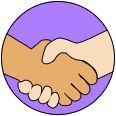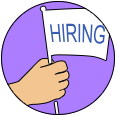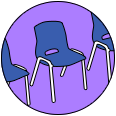| What Do Digital Media People Do? | Work Search Strategies |
Careers In Culture
Digital Media - What You Need to Do
Career Routes
On this page:
- Digital Media = Unlimited Career Paths!
- Name that Digital Media Skill
- Get a Head Start on Your Interactive Career
- Get and Stay "With It"
- Be a Digital Media Networker
- How to Get Experience
- Your Education Can Take You Places
Digital Media = Unlimited Career Paths!
Maybe you want to work in digital media graphic design or animation. Perhaps your creative writing skills would make you the ideal interactive scriptwriter. Or maybe you like the challenge of programming.

Whatever your preference, digital media offers a wide selection of occupations and career paths.
Name that Digital Media Skill
It takes more than one skill to succeed in a Digital Media career. Can you match the skills in the left column to the tasks in the right column? Drag each boxed number to an answer in the right column, and then check your answers.
Get a Head Start on Your Interactive Career
People come to Digital Media careers from many different backgrounds and interests. Getting started involves four musts:
- Stay current
- Acquire specialized skills while always keeping an eye on the "big picture"
- Build a wide network of contacts and
- Get hands-on experience
Develop Your Specialized Skills
Many people working in Digital Media have post-secondary education in a variety of fields, but they find that getting specialized training can boost their careers. Your local college/Cégep and university probably offer programs that can help you develop the skills you need.
What kind of courses might you take?
- Animation
- Audio technology
- Computer engineering
- Computer science
- Educational technology
- E-learning instructional design
- Multimedia scriptwriting
- New media design
- New media graphic arts
- Programming
- Television broadcasting
There are also less obvious careers in Digital Media that include everything from Marketing, Public Relations, Localization, Sales, Publishing, Finance, Internal IT Systems Support and Human Resources.
Get and Stay "With It"
Digital Media is changing so fast that what you know today may be out of date by tomorrow. What does that mean for you? You have to stay on top of what's happening. Here are some suggestions:
Keeping Up With Digital Media

Learn about new technologies
Changing technology is the name of the game in Digital Media. Get as much information as you can about new software, platforms for delivery, hardware and other technological advances. Stay current on where the emerging trends in technology are.
Surf the Internet as much as you can
Check out who's online. There are so many new avenues to pursue a career in Digital Media. Follow industry bloggers, join your provincial/regional association, create an RSS feed of cutting edge web sites. Maybe you'll be more interested in analyzing the content and the design of a web page or perhaps you're interested in optimizing online traffic to web sites. Get involved in online groups that discuss Digital Media topics; there are "Meet Up" groups, associations, online discussion opportunities and plenty of people in the sector who are willing to share. Volunteer at a Digital Media event! Get involved.
Read up on the Digital Media industry
Books, magazines and blogs about Digital Media can give you great information about major players, what's happening today and future trends.
Check out new movies and video games
What are the hot sellers and why? Read the games post-mortems, compare today's technologies with those used in older titles. How have advances in technologies changed the way producers are delivering content?
Be a Digital Media Networker
People who work as hiring managers in Digital Media are like employers in other industries. They prefer to hire people they know or who are recommended to them. As Digital Media grows, so does the number of people entering the field. How can you make the important contacts that can help you find the best work opportunities? The answer is networking – being visible by making and building your contacts.
Openings for Openers
 |
Stay in touch with like-minded people |
 |
Attend job fairs and career days |
 |
Go to activities organized by professional associations |
Additional Advice
How to Get Experience
Hands-on experience
People who hire Digital Media workers are looking for applicants with hands-on experience and up-to-date understanding of new technologies. Use the following checklist to figure out ways to get this important know-how.
How to get experience
I could...
- Practice building Digital Media programs and websites with different authoring software programs.
- Volunteer to build a website for my school or a local non-profit organisation.
- Get a co-op placement at a Digital Media company.
- Create a Digital Media Club in my school that brings in speakers to talk about their experiences in this field.
- Download free software tools online and explore what they can do and what I can create.
- Get a part-time or summer job at a technology-related store.
- Gather a group of like-minded students with different skillsets and work together as a team to see what we can create.
- Work with a musical group to create a YouTube music videos, create a mobile app or upload their music on the Internet as downloadable content.
- Install, repair and maintain computer hardware and software for my family, friends and/or my school.
- Design a personal website.
- Volunteer at local organisations or businesses to help them with their computer network systems.
- Start a blog or a podcast.
How many boxes did you check off? Do you see many opportunities to gain hands-on experience in Digital Media? Can you think of others?
Listen to what our experts have to say on how to get hands-on experience!
Your Education Can Take You Places
Education is Key
Employers are looking for people who are able to learn and have strong analytical skills. The ability to communicate is critical since Digital Media work often involves working in a team and sharing ideas. Develop your writing skills and strive to improve your interpersonal and communication skills; these skills will serve you well during the course of your career.
Your university degree or diploma from a college or Cégep is proof that you've developed these skills. Additional specialized training in various software, engineering, computer science and multi-media/Digital Media can boost your opportunities.